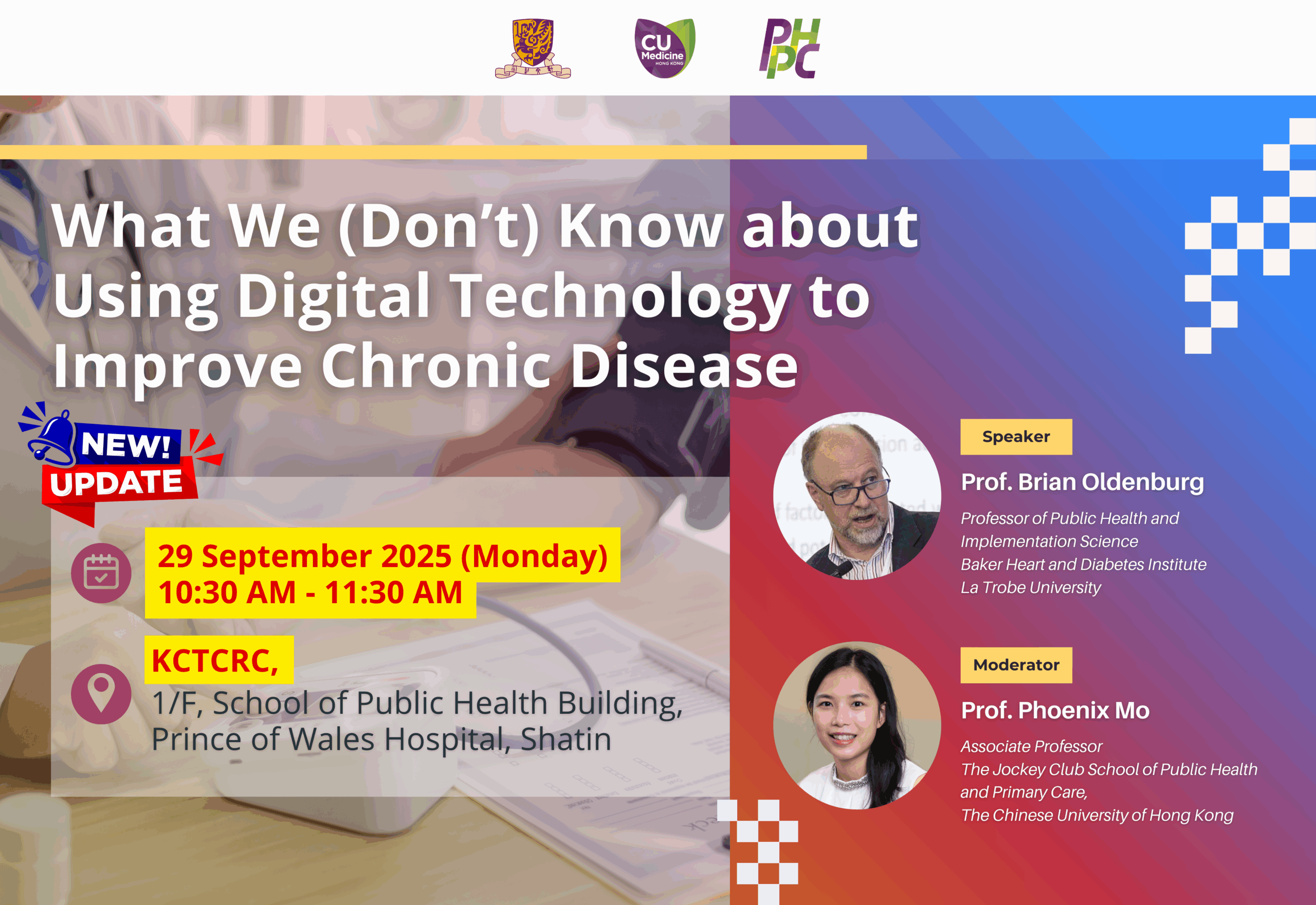Hosted by The JC School of Public Health and Primary Care (JCSPHPC) of The Chinese University of Hong Kong (CUHK), the upcoming seminar titled “What We (Don’t) Know about Using Digital Technology to Improve Chronic Disease” will take place on 29 September 2025 (Monday) due to rescheduling incurred by the Super Typhoon Ragasa.
We are honoured to welcome Professor Brian Oldenburg, Professor of Public Health and Implementation Science at the Baker Heart and Diabetes Institute and La Trobe University, Australia. In this seminar, Professor Oldenburg will explore why digital health technologies, despite their abundance, have yet to significantly improve chronic disease outcomes at scale. He will highlight how poor design, implementation, and integration into healthcare systems are the real barriers, and how implementation science and stakeholder co-design can help bridge the gap between innovation and impact.
The seminar will be moderated by Professor Phoenix Mo, Associate Professor of JCSPHPC.
Registration will be extended to noon on 26 September 2025 (Friday).
Please refer to the details below:
| Date & Time | 29 Sep 2025 (Mon) 10:30 am – 11:30 am |
| Venue | KCTCRC, 1/F, School of Public Health Building, Prince of Wales Hospital, Shatin |
| Mode | In-Person |
| Topic | What We (Don’t) Know about Using Digital Technology to Improve Chronic Disease |
| Speaker | Prof. Brian Oldenburg Professor of Public Health and Implementation Science Baker Heart and Diabetes Institute La Trobe University (More about Prof. Oldenburg) |
| Moderator | Prof. Phoenix Mo Associate Professor The Jockey Club School of Public Health and Primary Care The Chinese University of Hong Kong |
Seminar Abstract
Although the promise is great, the potential benefits of technology for improving chronic disease outcomes at scale have not been realised. This gap between evidence and implementation is definitely not due to any lack of innovativeness in available technologies. There are more patient apps, wearable sensors, and decision support systems than ever! Rather, this gap is due to poor co-design, implementation, and integration into healthcare delivery. Our traditional approaches to undertaking research and trials have also lacked agility and often have not involved patients, clinicians, and other stakeholders in the co-design, implementation, and evaluation of new “solutions”. The COVID-19 pandemic and its disruption to traditional healthcare delivery demonstrated new ways and approaches to rapid, large-scale implementation. The recent burgeoning field of implementation science also highlights exciting new ways of evidence development. Recently conducted research on diabetes, cardiovascular disease, and stroke will be used in this talk to illustrate how it is possible to improve the impact and sustainability of digital technologies for the benefit of patients, clinicians, and the healthcare system.
About the Speaker
Brian Oldenburg is Professor of Public Health and Implementation Science at the Baker Heart and Diabetes Institute and La Trobe University in Australia. Formerly, he was Professor of Public Health at the University of Melbourne. He is Director of the Australia Connected Health Centre of Research Excellence in Digital Technology and Director of Academic Research Collaboration in Health at the Alfred University Teaching Hospital. He is a behavioural scientist and chronic disease epidemiologist who researches the prevention and control of cardiometabolic diseases in high-income and resource-constrained settings and his research has developed new community-based and health system interventions to improve diabetes and other health outcomes. He is a world expert in implementation science. He has been PI/Co-PI of US NIH, UK NIHR, and NHMRC grants for the last 30 years, including for research in Asia and sub-Saharan African countries. Currently, he is a Visiting Professor, Danish Diabetes and Endocrine Academy at the Steno Diabetes Center Copenhagen, Denmark (2023-25).
About the Moderator
Dr. Phoenix Mo is a chartered psychologist of the British Psychological Society, a chartered scientist of the UK Science Council, and an Associate Fellow of the British Psychological Society and the Hong Kong Psychological Society. She obtained her undergraduate degree in Social Sciences (majoring in Psychology) at the University of Hong Kong, followed by an MSc in Health Psychology and Ph.D. at the University of Nottingham, UK. Phoenix has an active interest in Health Psychology and Behavioral Health and her research interests are to explore the cognitive, social, and psychological aspects of disease prevention and management, mental health research and promotion among vulnerable or diseased populations, and the development of theory-based and evidence-based digital health interventions. She has published more than 180 papers in peer-reviewed academic journals. She has obtained research grants from local government (e.g. Research Grants Council and Food and Health Bureau), mainland China (e.g. National Science of Foundation of China), and international organisation (e.g. Lifespan/Tufts/Brown Center for AIDS Research) as a principal investigator. These projects reflect her research interest, and comprehensive knowledge in the fields of behavioral health, mental health, and digital health.

